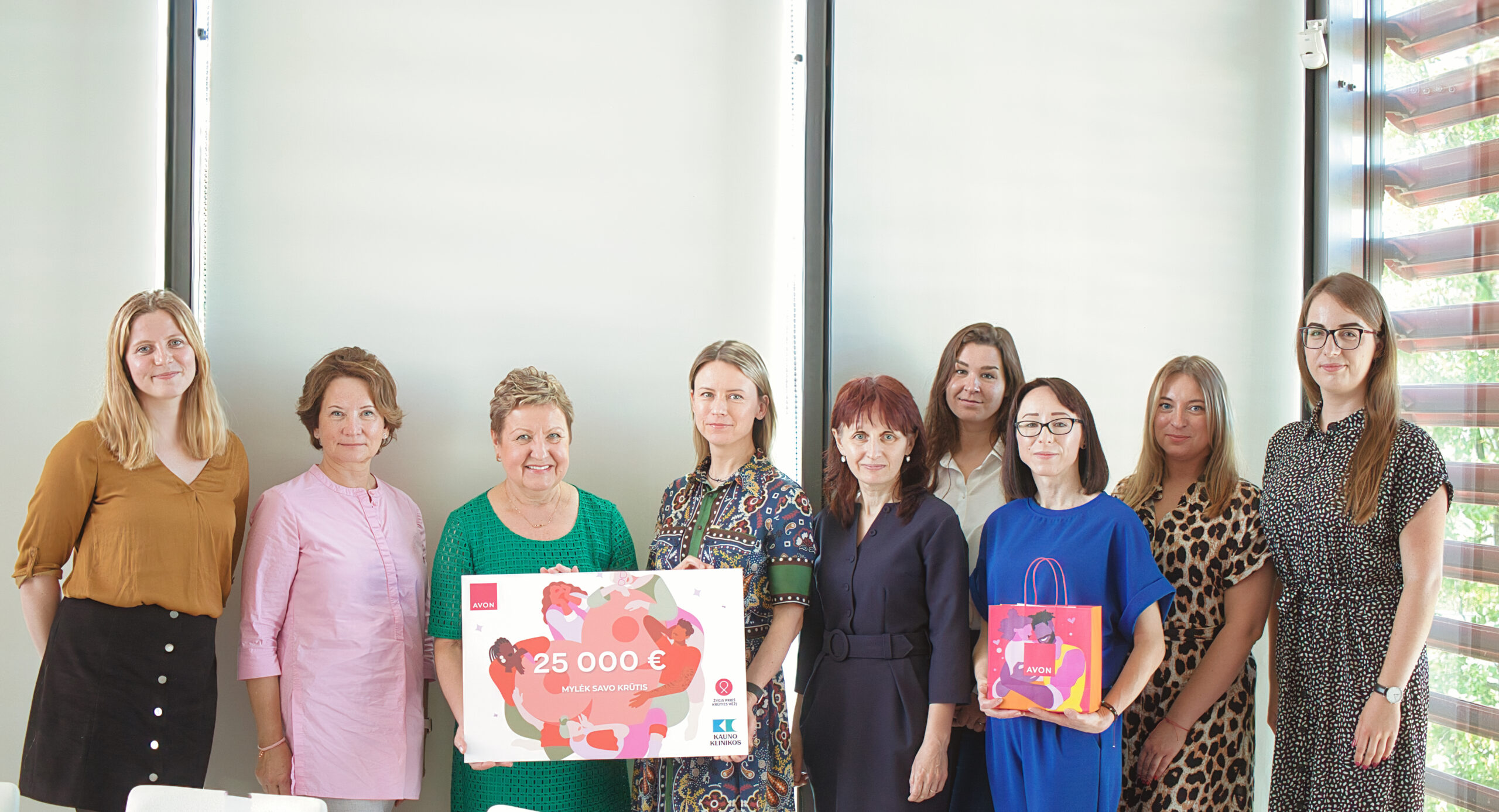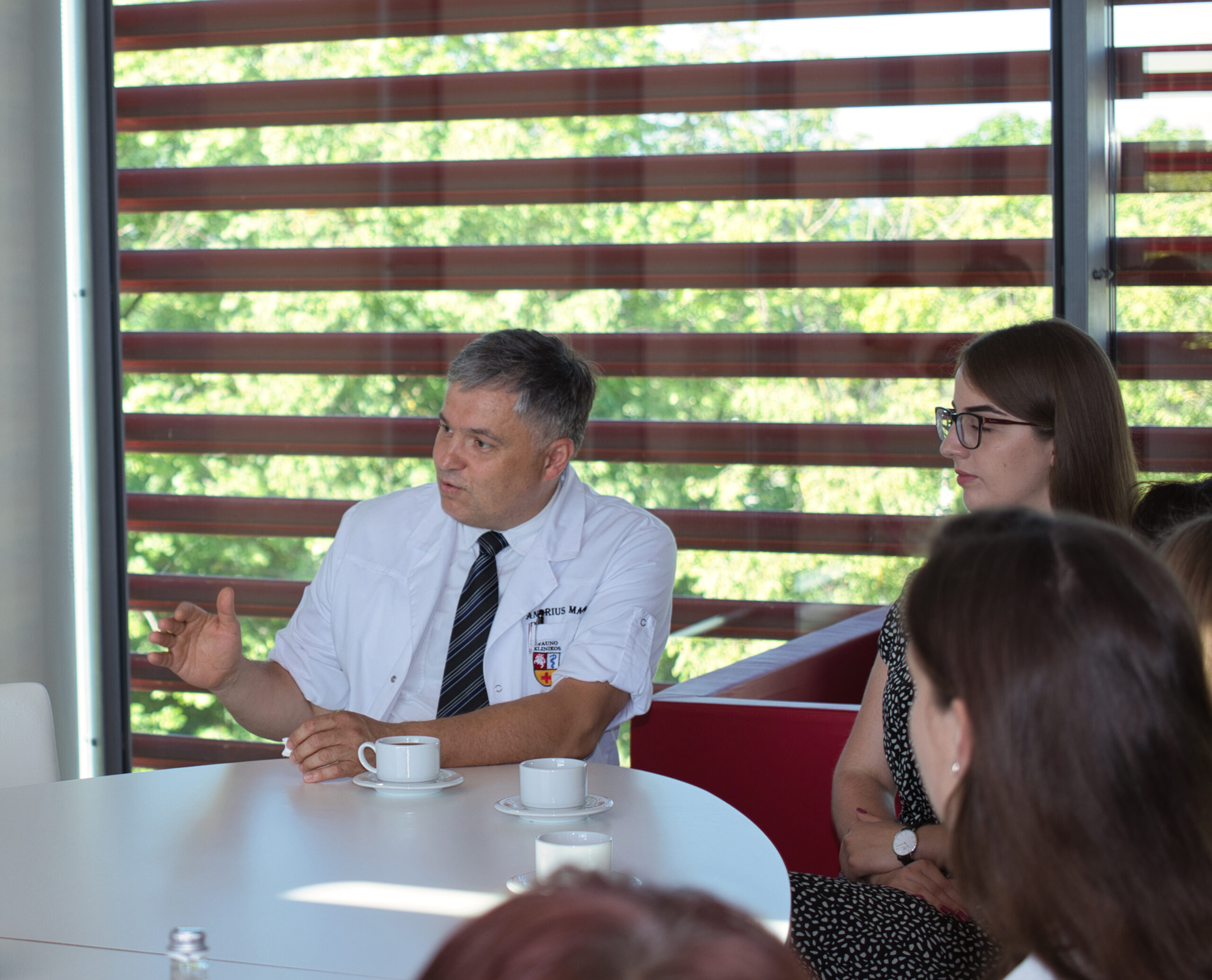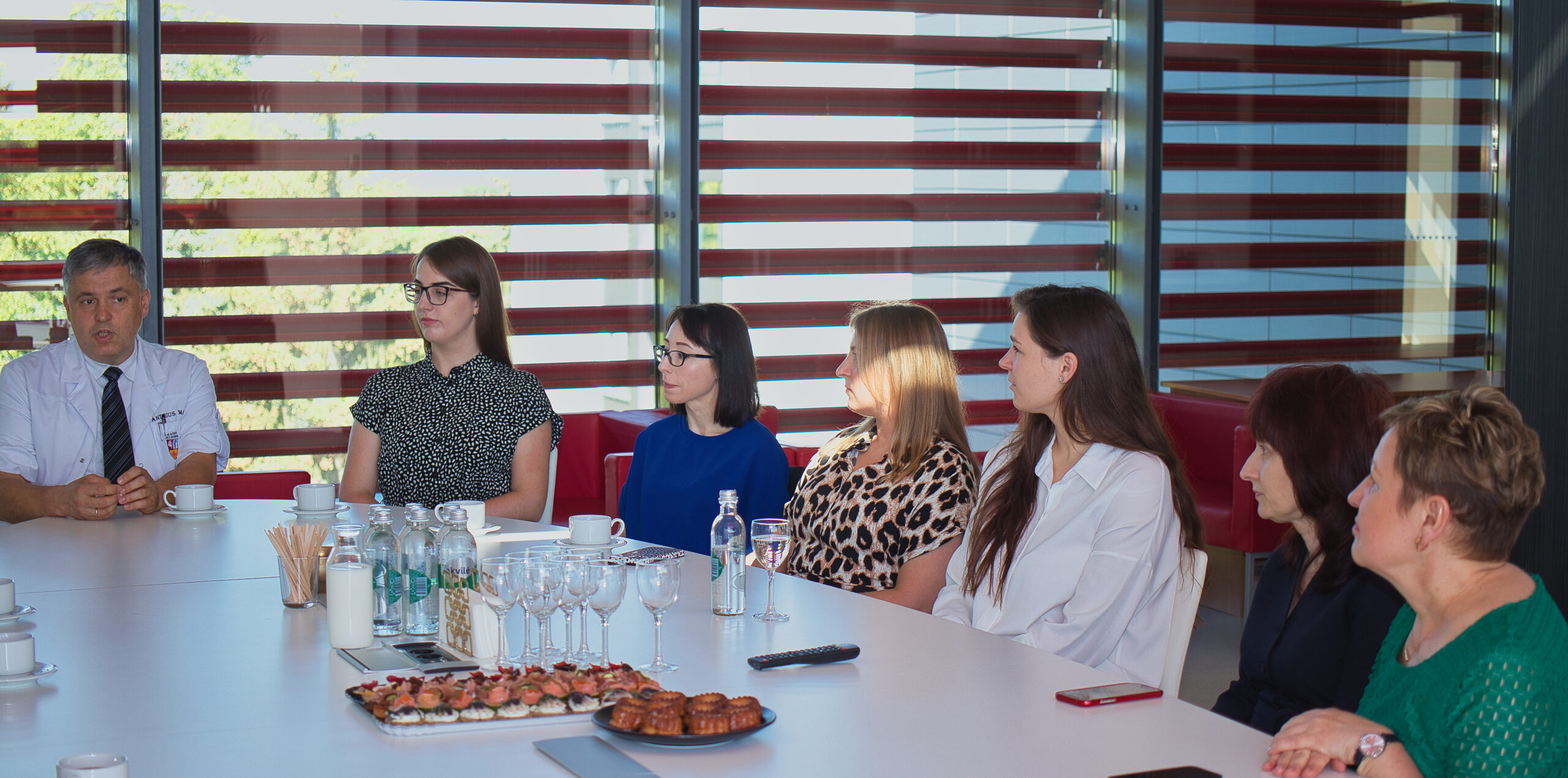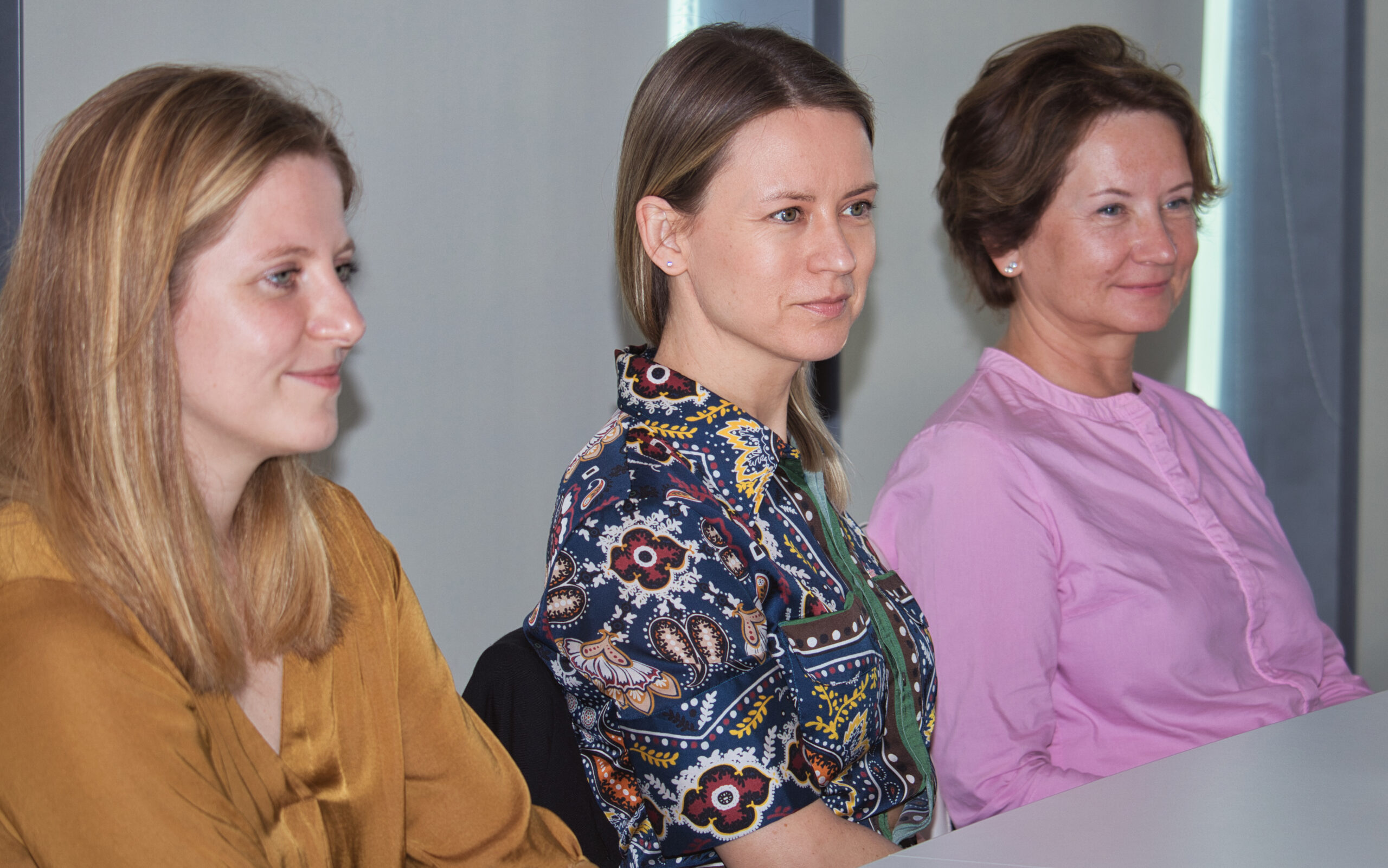Generous Support to the Institute of Oncology from a Globally Renowned Company

The Lithuanian University of Health Sciences (LSMU) has received a remarkable donation.
Celebrating the 25th anniversary of its activity in Lithuania, the cosmetics company Avon, a renowned advocate of various anti-cancer causes, has pledged 25,000 Euros to support the reconstruction of the Oncology Research Laboratory of the Institute of Oncology of the LSMU Faculty of Medicine. This generous donation will also fund breast cancer research conducted at the laboratory.
On this occasion, the company’s representatives Roberta Dargevičienė and Lina Norvaišė presented a symbolic donation cheque to Professor Elona Juozaityte, Head of the Department of Oncology and Haematology and the Institute of Oncology at the LSMU Faculty of Medicine.
The meeting was also attended by Prof. Andrius Macas, Dean of the LSMU Faculty of Medicine, Prof. Rasa Ugenskienė, Head of the Department of Genetics and Molecular Medicine, and Danguolė Laukaitienė, Justina Jurevičė, Roberta Vadeikienė, Agnė Bartnykaitė, junior researchers at the Institute of Oncology.
The guests from Avon were given a detailed presentation of the scientific and clinical activities of Kaunas Clinics (Kauno Klinikos) in breast cancer treatment.
Benefits offered by the University Hospital
According to Prof. E. Juozaitytė, breast cancer is the most frequently diagnosed oncological disease. Oncological diseases are diagnosed and treated at Kaunas Clinics of the Lithuanian University of Health Sciences in close cooperation with all profile clinical departments.
The professor emphasised that a major strength of Kaunas Clinics is the involvement of specialists from various fields are involved in addressing clinical problems. Kaunas Clinics is a hospital with a highly integrated structure and processes: cancer surgeries are performed by surgeons from different fields, pain management specialists also play a crucial role, and pathologists and geneticists are involved in the examination of these patients. Thanks to the Green Corridor system, the first oncology consultation at Kaunas Clinics takes place within a week.
“We have an ambitious goal to provide patients with a radiological diagnosis of breast cancer and a biopsy within a single day.
In parallel to clinical activities, we are also developing our research activities: the Institute of Oncology conducts research of strategic importance to the University, trains students, and is developing a strong team of young researchers who are conducting research in various areas of oncology. The reconstruction of the Oncology Research Laboratory is necessary due to the planned infrastructural and research development and in order to improve the working conditions of the researchers”, – said Prof. E. Juozaitytė.
“Another advantage of the University Hospital is that most of the specialists are not only experienced clinicians, but also researchers. Lithuanian researchers hold a prominent position in the field of oncology and are well-known on the international stage”, – said Prof. A. Macas, Dean of the LSMU Faculty of Medicine.
“Your support not only helps oncology science keep pace with global trends, but also sends an encouraging message to the public that people with this diagnosis are not alone and that there are increasingly more innovative solutions for oncological diseases,” the professor emphasised, thanking Avon for their generous gesture.
Comprehensive guidelines after a 162-gene test
Prof. Rasa Ugenskienė, a geneticist and head of the Department of Genetics and Molecular Medicine, has shared with us that currently, the Department performs 162 gene tests for each oncology patient, if indicated. If a gene change (pathogenic or potentially pathogenic variant) is detected, detailed guidelines are developed for the patient for further monitoring, testing, and treatment.
We cannot “fix” genes. If an inherited cancer syndrome is detected, the patient must be monitored not only for the cancer for which he or she has presented, but also for an increased risk of other cancers. The altered gene is present in every cell in the body, so other cancers can develop in different parts of the body,” said the professor.
For breast cancer, some genes, such as BRCA1 and BRCA2, have rather strict guidelines: the other breast needs to be monitored, the pancreas or the intestines may be affected, and melanoma may develop. Patients are advised to consult an oncogynaecologist and a breast surgeon. The indications and options for removal of ovaries with appendages and breasts might also be necessary to discuss. The aim is to prevent the further development of other oncological diseases.
Healthy first-degree relatives are tested in parallel, and a detailed recommendation is made when gene variants are identified. “We get to know the whole family. There are cases where, despite a 50% risk of hereditary cancer syndrome being passed on to the offspring, everyone in the family is affected,” said Prof Ugenskienė.
The Head of the Clinic also pointed out the importance of advanced equipment: today, Kaunas Clinics have three Next Generation Sequencers (NGS).
Two decades of donation campaigns in Lithuania
“Avon supports causes in Lithuania and around the world that promote women’s financial independence, and contribute to the fight against breast cancer and violence against women.
According to the company’s representative R. Dargevičienė, these causes were launched in Lithuania two decades ago. Since then, a lot of funds have been allocated to the diagnosis of breast cancer, while in other countries, a cause of emotional support for women is already underway.
L. Norvaišė noted that when the company started its donation initiative in Lithuania, the funds were initially allocated to more tangible items like biopsy needles. Since these needs are now compensated by the state, Avon’s donations can be redirected to more important causes, such as research.



